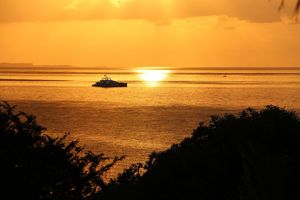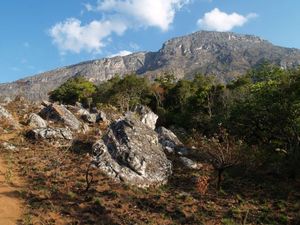What makes serving the Lord in Mozambique so exciting is knowing that the gospel is reaching many areas for the very first time. The church is in her first generation, and work done now could have a lasting impact for generations to come. What an opportunity!
Past and present
Throughout the 470 years of Portuguese colonial rule in Mozambique, the Roman Catholic Church dominated the religious scene. A few Protestant missions were allowed to establish themselves (Methodists in 1879, Swiss Presbyterians in 1881, Anglicans in 1893, and others in a post-World War I missionary surge), but they were restricted to areas where the Catholics already maintained a religious monopoly — the southern and central regions. Romanism never really established itself in northern Mozambique (largely Muslim).
At independence in 1975, with the loosing of colonial Roman Catholicism, the doors should have been thrown open for Protestant and Evangelical activities. But the newly formed Mozambican government allied itself with communist regimes around the world.
Russian and Cuban military personnel arrived in significant numbers and a period of persecution of Christians began. Large numbers of foreign missionaries were forced to leave, but the church still grew!
The Russians were sent home by the government in the mid-1980s, churches were given limited freedoms, and missionaries were guardedly welcomed to Mozambique once again.
Religious freedom at last? Not quite, for during that period the civil war was at its fiercest. Landmines peppered the countryside and evangelists, pastors and missionaries could not travel freely to preach.
It was not until 10 years ago, when the civil war came to an end that, for the first time in her history, the church was able to expand and grow in a relatively unhindered way.
Evangelical churches
Evangelical churches in Mozambique today have the following characteristics:
1. Personal sacrifice. Many Christian leaders have suffered in spreading God’s Word. Imprisonment, persecution, and arduous travel have accompanied the growth of the church. Many have served the Lord at great personal cost.
2. Eagerness to learn. Ignorance of basic Bible facts and doctrines is widespread even among pastors. Thankfully, this lack of knowledge is matched by an eagerness to learn.
3. Traditionalism. Recently a missionary who attempted to introduce some gimmicks he had seen on television into the worship service of an Evangelical church was immediately called to account by national church leaders. His new practices did not accord with what their founders had taught from the Bible four generations ago.
But it has to be said that this kind of ‘traditionalism’ has also led to unnecessary suspicion towards genuine, but yet-to-be-taught, biblical doctrines and towards new missionaries or teaching materials.
Trouble with money
4. Financial subservience. Many national Christian leaders might not agree with the pastor who announced ‘We don’t need the missionaries’ doctrine; what we need is their project funding and vehicles!’ Nevertheless, handouts by missionaries have been so prolific that it is assumed that every missionary will fund a myriad of local projects.
Countless misunderstandings and jealousies have arisen over the missionary’s role as ‘church financier’. The lack of financial support from local churches for pastors is probably related to this situation. I personally do not know of one full-time pastor in Mozambique who is fully supported by his local church.
Fragility
5. Fragile relationships. Relationships between national churches and foreign missions are fragile. The causes are often complex.
Once, when I observed an obvious need in a certain Evangelical denomination, I suggested to its founding evangelist that he put out a call for another foreign missionary or two.
His response was: ‘No more missionaries! Missionaries bring confusion and don’t know how to work with us’. The missionary community here was shocked recently when the United Baptist Church (the largest Evangelical group) suddenly expelled all 20 missionaries from their midst.
Similarly, though race relationships in Mozambique are relatively healthy at the time, a missionary who exhibits an imperialistic or domineering approach to national believers is rarely welcome.
6. Hierarchical structures. Most Evangelical churches have a hierarchical form of church government, with one national superintendent, a provincial pastor for each province and district pastor for each district.
The government itself requires a national representative from each religious body. Some of these powerful positions are occupied by unsuitable men.
7. An indigenous church. I once visited a mission station in another part of Africa with a strong missionary history. Had I closed my eyes during Sunday worship, I could have sworn I was back in America!
Not so in Mozambique. The church has developed in a truly indigenous fashion, due, I suppose, to the years of restriction and isolation.
Evangelical and Reformed groups
Throughout Mozambique there are many fine national and foreign workers serving within a variety of churches and missions. SIL and others are making good progress in translating the Scriptures into various languages. Radio FEBA and TWR broadcast in a number of tongues.
About 20 evangelical Bible schools function throughout the nation. The best known include those run by the Reformed Church in Mozambique (Tete), the Assemblies of God (Maputo), the Nazarene Church (Maputo) and the Africa Inland Mission (Beira).
The Presbyterian Church (Swiss Mission, over 1,000 congregations) belongs to the ecumenical Christian Council of Mozambique. Much of its theology is modernistic.
The most influential Reformed Church is the Reformed Church in Mozambique (120 congregations), established in 1908 by Dutch Reformed missionaries from South Africa. It has two Bible Schools, well-trained pastors and good missionaries. It is active in relief and development projects. The leadership makes good use of Reformed creeds, notably the Heidelberg Catechism.
In Nampula the Believers Fellowship Church was planted by medical missionaries Dr Charles and Julie Woodrow (Grace Missions, USA). Though small, this church teaches the doctrines of grace. Grace Evangelical Hospital, under construction in Nampula and supervised by Dr Woodrow, will serve as a testimony to Christ throughout northern Mozambique.
Literature
Editora Fiel, a Brazilian publishing house for Reformed literature, has asked us (in Maputo) to administer their ministries throughout Mozambique. We distribute their quarterly magazine Faith for Today, post a free monthly book to sponsored pastors, and arrange seminars and conferences for church leaders.
The firstConferencia Fiel last year was a tremendous success, with Martin Holdt (South Africa) delivering challenging addresses.
Other Reformed missionaries are scattered around the country. We ourselves (sent from Christian Brethren assemblies) teach in an indigenous Evangelical group called the New Alliance Church (120 congregations).
Let us thank the Lord of the harvest for freedom to preach his Word and for the growth of his people. Pray that the Lord will prosper his Word among a pivotal generation for the church in Mozambique.














